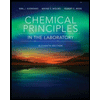True or False The three states of matter can be interconverted without changing the substance's composition. A substance is a matter that has indefinite composition but with distinct properties. Color, melting point, density and boiling point are physical properties of matter
True or False The three states of matter can be interconverted without changing the substance's composition. A substance is a matter that has indefinite composition but with distinct properties. Color, melting point, density and boiling point are physical properties of matter
Chemistry & Chemical Reactivity
10th Edition
ISBN:9781337399074
Author:John C. Kotz, Paul M. Treichel, John Townsend, David Treichel
Publisher:John C. Kotz, Paul M. Treichel, John Townsend, David Treichel
Chapter11: Intermolecular Forces And Liquids
Section: Chapter Questions
Problem 41IL
Related questions
Question
True or False
- The three
states of matter can be interconverted without changing the substance's composition. - A substance is a matter that has indefinite composition but with distinct properties.
- Color, melting point, density and boiling point are physical properties of matter
- We cannot recover hydrogen and oxygen from water by a physical change like boiling or freezing.
- Intramolecular forces hold atoms together in a molecule.
- In order to evaporate a liquid, much less energy is needed than to to break the bonds in the liquid's molecules.
- Molecules with temporary dipole moment tend to align with opposite polarities in the solid phase for maximum attractive interaction.
- The boiling points of compounds containing elements in the same periodic group is inversely proportional to the element's molar mass.
- When adhesion is greater than cohesion, a convex appearance of the liquid in a tube is evident.
- When cohesion is greater than adhesion, a concave appearance of the liquid in a tube is evident.
- if water has no ability to form hydrogen bonds, it would be gas at room temperature.
- The attractive interaction between an ion and the induced dipole is called ion-induced dipole force.
- A polar molecule placed near an atom causes distortion of the electron cloud of the atom resulting to a dipole.
- Polarizability prevents gases containing non polar molecules to condense.
- Hydrogen bond is stronger than covalent bond.
Expert Solution
This question has been solved!
Explore an expertly crafted, step-by-step solution for a thorough understanding of key concepts.
This is a popular solution!
Trending now
This is a popular solution!
Step by step
Solved in 2 steps with 2 images

Recommended textbooks for you

Chemistry & Chemical Reactivity
Chemistry
ISBN:
9781337399074
Author:
John C. Kotz, Paul M. Treichel, John Townsend, David Treichel
Publisher:
Cengage Learning

Chemistry & Chemical Reactivity
Chemistry
ISBN:
9781133949640
Author:
John C. Kotz, Paul M. Treichel, John Townsend, David Treichel
Publisher:
Cengage Learning

Chemistry: Matter and Change
Chemistry
ISBN:
9780078746376
Author:
Dinah Zike, Laurel Dingrando, Nicholas Hainen, Cheryl Wistrom
Publisher:
Glencoe/McGraw-Hill School Pub Co

Chemistry & Chemical Reactivity
Chemistry
ISBN:
9781337399074
Author:
John C. Kotz, Paul M. Treichel, John Townsend, David Treichel
Publisher:
Cengage Learning

Chemistry & Chemical Reactivity
Chemistry
ISBN:
9781133949640
Author:
John C. Kotz, Paul M. Treichel, John Townsend, David Treichel
Publisher:
Cengage Learning

Chemistry: Matter and Change
Chemistry
ISBN:
9780078746376
Author:
Dinah Zike, Laurel Dingrando, Nicholas Hainen, Cheryl Wistrom
Publisher:
Glencoe/McGraw-Hill School Pub Co

World of Chemistry
Chemistry
ISBN:
9780618562763
Author:
Steven S. Zumdahl
Publisher:
Houghton Mifflin College Div

World of Chemistry, 3rd edition
Chemistry
ISBN:
9781133109655
Author:
Steven S. Zumdahl, Susan L. Zumdahl, Donald J. DeCoste
Publisher:
Brooks / Cole / Cengage Learning

Chemical Principles in the Laboratory
Chemistry
ISBN:
9781305264434
Author:
Emil Slowinski, Wayne C. Wolsey, Robert Rossi
Publisher:
Brooks Cole